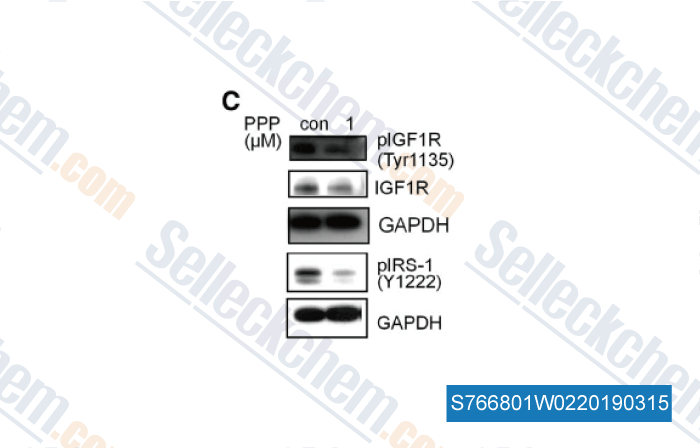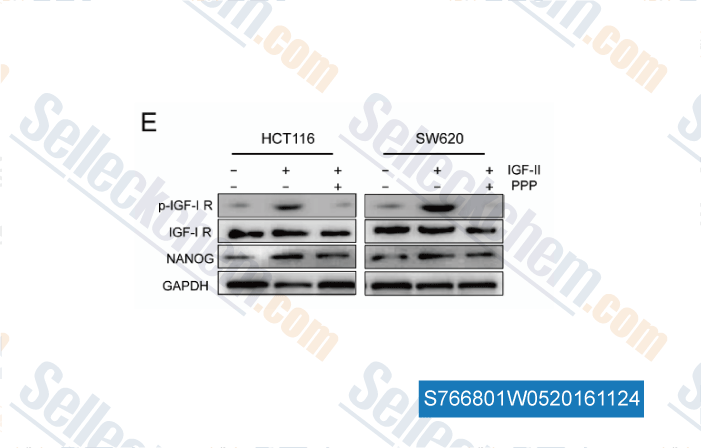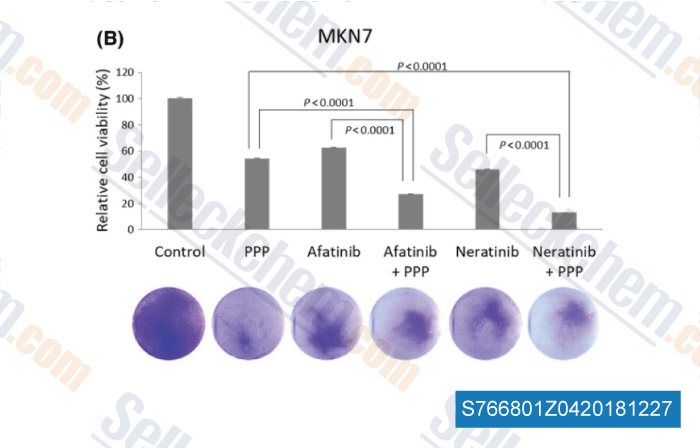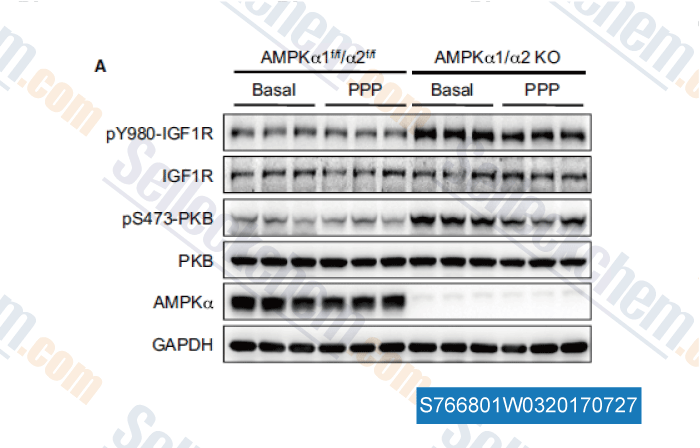|
Toll Free: (877) 796-6397 -- USA and Canada only -- |
Fax: +1-832-582-8590 Orders: +1-832-582-8158 |
Tech Support: +1-832-582-8158 Ext:3 Please provide your Order Number in the email. |
Technical Data
| Formula | C22H22O8 |
|||
| Molecular Weight | 414.41 | CAS No. | 477-47-4 | |
| Solubility (25°C)* | In vitro | DMSO | 83 mg/mL (200.28 mM) | |
| Water | Insoluble | |||
| Ethanol | Insoluble | |||
|
* <1 mg/ml means slightly soluble or insoluble. * Please note that Selleck tests the solubility of all compounds in-house, and the actual solubility may differ slightly from published values. This is normal and is due to slight batch-to-batch variations. * Room temperature shipping (Stability testing shows this product can be shipped without any cooling measures.) |
||||
Preparing Stock Solutions
Biological Activity
| Description | Picropodophyllin (PPP, AXL1717) is a IGF-1R inhibitor with IC50 of 1 nM. It displays selectivity for IGF-1R and does not coinhibit tyrosine phosphorylation the IR, or of a selected panel of receptors less related to IGF-IR(FGF-R, PDGF-R, OR EGF-R). Picropodophyllin (PPP) induces apoptosis with antineoplastic activity. | ||
|---|---|---|---|
| Targets |
|
||
| In vitro | In intact cells, PPP efficiently inhibits IGF-1-stimulated IGF-1R, Akt (Ser 473) and Erk1/2 phosphorylation. Picropodophyllin specifically inhibits cell growth, and induces apoptosis in cultured IGF-1R-positive tumor cells. [1] Picropodophyllin synergistically sensitizes HMCL, primary human MM and murine 5T33MM cells to ABT-737 and ABT-199 by further decreasing cell viability and enhancing apoptosis. [3] Picropodophyllin synergistically suppress the proliferation and motility of hepatocellular carcinoma cells. [4] |
||
| In vivo | In SCID mice xenografted with human ES-1, BE, and PC3, Picropodophyllin (20 mg/kg/12 h, i.p.) causes complete tumor regression. [1] In the 5T33MM mouse model, Picropodophyllin also shows a marked antitumor activity, and causes a significant increase in survival. [2] |
Protocol (from reference)
| Kinase Assay: |
|
|---|---|
| Cell Assay: |
|
| Animal Study: |
|
References
Customer Product Validation

-
Data from [Data independently produced by , , Blood, 2013, 122(9):1621-33]

-
Data from [Data independently produced by , , Stem Cells, 2016, 34(4):820-31.]

-
Data from [Data independently produced by , , Cancer Sci, 2018, 109(4):1166-1176]

-
Data from [Data independently produced by , , FEBS J, 2017, 284(13):2096-2109]
Selleck's Picropodophyllin (PPP) has been cited by 47 publications
| Disrupting AGR2/IGF1 paracrine and reciprocal signaling for pancreatic cancer therapy [ Cell Rep Med, 2025, 6(2):101927] | PubMed: 39914384 |
| Picropodophyllin, an IGF‑1 receptor inhibitor, enhances oxaliplatin efficacy in chemoresistant colorectal cancer HCT116 cells by reducing metastatic potential [ Oncol Lett, 2025, 29(5):220] | PubMed: 40103601 |
| Nutrient-regulated dynamics of chondroprogenitors in the postnatal murine growth plate [ Bone Res, 2023, 11(1):20] | PubMed: 37080994 |
| Nutrient-regulated dynamics of chondroprogenitors in the postnatal murine growth plate [ Bone Res, 2023, 11(1):20] | PubMed: 37080994 |
| Synergy of 5-aminolevulinate supplement and CX3CR1 suppression promotes liver regeneration via elevated IGF-1 signaling [ Cell Rep, 2023, 42(8):112984] | PubMed: 37578861 |
| Scalable generation of sensory neurons from human pluripotent stem cells [ Stem Cell Reports, 2023, 18(4):1030-1047] | PubMed: 37044067 |
| IGF1R Inhibition Enhances the Therapeutic Effects of Gq/11 Inhibition in Metastatic Uveal Melanoma Progression [ Mol Cancer Ther, 2023, 22(1):63-74] | PubMed: 36223548 |
| Inhibition of the epigenetically activated miR-483-5p/IGF-2 pathway results in rapid loss of meningioma tumor cell viability [ J Neurooncol, 2023, 162(1):109-118.] | PubMed: 36809604 |
| Effect of insulin-like growth factor system on luteinising angiogenesis [ Reprod Fertil, 2023, 4(2)e220057 RAF-22-0057] | PubMed: 37052337 |
| A Role for Insulin-like Growth Factor 1 in the Generation of Epileptic Spasms [ Ann Neurol, 2022, 10.1002/ana.26383] | PubMed: 35467038 |
RETURN POLICY
Selleck Chemical’s Unconditional Return Policy ensures a smooth online shopping experience for our customers. If you are in any way unsatisfied with your purchase, you may return any item(s) within 7 days of receiving it. In the event of product quality issues, either protocol related or product related problems, you may return any item(s) within 365 days from the original purchase date. Please follow the instructions below when returning products.
SHIPPING AND STORAGE
Selleck products are transported at room temperature. If you receive the product at room temperature, please rest assured, the Selleck Quality Inspection Department has conducted experiments to verify that the normal temperature placement of one month will not affect the biological activity of powder products. After collecting, please store the product according to the requirements described in the datasheet. Most Selleck products are stable under the recommended conditions.
NOT FOR HUMAN, VETERINARY DIAGNOSTIC OR THERAPEUTIC USE.
